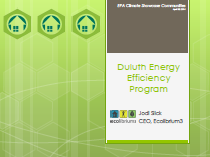Cold Climate Community Solutions – Duluth Energy Efficiency Program
Learn about other climate showcase communities.
Duluth, Minnesota
Federal Funding: $500,000
Project Timeline: February 2011 – February 2014
- Project Summary
- Community Characteristics
- Results
- Lessons Learned
- Sustainability/ Replication
- Project Websites
The City of Duluth developed the Duluth Energy Efficiency Program (DEEP) to create jobs, lessen the energy affordability gap faced by Duluth families, retain energy dollars currently exported from the city, and reduce Duluth's carbon footprint. DEEP focused on residential energy-efficiency and developed best practices for community behavior change and the installation of energy-efficiency measures. DEEP worked to improve housing affordability and reduce energy costs through four "pathways," each focusing on a different residential circumstance, including single-family, multi-family (5+ units), do-it-yourself, and low-income advanced energy retrofits. The program recognized the different barriers to energy-efficiency faced in each of these circumstances and developed pathway-specific resources for each.
For single-family households, DEEP provided energy counseling that takes participants through audits, actual improvements, and quality assurance. All improvements were installed by Building Performance Institute (BPI) certified contractors. The multi-family pathway, on the other hand, provided options for both landlords and tenants to save on their energy bills. Tenants received low- or no-cost measures to reduce electric and water usage, and landlords were encouraged to help organize tenant workshops to maximize participation and landlord audit subsidies. For individuals who would rather do their own improvements, the Do-It-Yourself pathway provided access to a specialized workshop and a BPI technician to conduct blower door testing, scope development, one day of side-by-side assistance, and follow-up quality assurance. Finally, the low-income pathway of the program rehabilitated blighted, foreclosed, and condemned structures. These structures served as training sites for current state inmates, supervised by trained carpenters. All rehabilitated buildings were designed to have a Home Energy Rating System (HERS) rating over 70. Building purchasers would then attend DEEP workshops to receive information on behavioral change energy reductions.
For all pathways, DEEP conducted outreach to find participants, assisted with a Home Energy Rating, maintained a database of all clients, and offered workshops and demonstrations tailored to client's needs, as well as tailored financing assistance, home performance audits, and quality assurance follow-up once improvements were made. In addition to reducing energy-use, energy costs, and greenhouse gases, the program created awareness of lead and radon testing, improved indoor air quality, created jobs, and developed affordable housing.
The Duluth Energy Efficiency Program (DEEP) increased residential energy-efficiency through home retrofit projects. DEEP completed home energy retrofits for 902 homes. DEEP also focused on providing energy retrofit assistance to households affected by a flood that occurred in June 2012, and the City of Duluth incorporated the Duluth Energy Efficiency Standards into the rebuilding efforts.
DEEP developed the Duluth One-Stop Energy Shop where homeowners were able to:
- get energy scores,
- sign up for audits,
- obtain referrals to other community energy programs,
- receive financial and technical counseling,
- get assistance on bidding out home energy improvements,
- borrow energy testing equipment, and
- attend community education classes.
Over 2,000 households participated in online or in-person energy efficiency workshops. The City launched a program with four churches in the Duluth area to improve energy-use at their facilities. The pilot program contributed to a church “energy fund” for church energy improvements based on members participation in residential energy audits.
Population: 84,463
Area: 68 square miles
Government Type: City
Community Type: Urban
Median household income: $39,602
|
Final Results |
Projected Cumulative Results |
|
|---|---|---|
|
Annual GHG Reductions |
1,257.6 mt CO2e |
7,012 mt CO2e |
|
Annual Electricity Savings |
735 MWh |
5,000 MWh |
|
Buildings Retrofitted/Weatherized |
902 |
-- |
|
Green Jobs Created |
6.4 |
10 |
|
Annual Energy Cost Savings |
$625,667 |
$680,000 |
- A free tool can help customers assess the benefits of investing in an audit. The program recommended using a tool that has already been created instead of developing a new tool specific to the project.
- Direct installations during audits accounted for a significant portion of carbon emission reductions.
- If multiple funding sources are available, it is helpful to bundle financial resources that provide assistance packages to low-income participants.
- DEEP staff have already helped other communities develop similar programs, including the Cook County Local Energy Project’s Residential Energy Efficiency Program (REEP) pilot.
- DEEP audit forms and protocols are utilized by five local audit firms for developing scopes of work for buildings throughout Minnesota.
- The Siletz Tribal Energy Program in Oregon is using the DEEP application process for contractor scholarships.
- A DEEP participant is an international energy consultant, and is using the DEEP model in projects overseas.
- Ecolibrium3 is looking to expand the DEEP model to other nearby regions and to other sectors in the City of Duluth.

